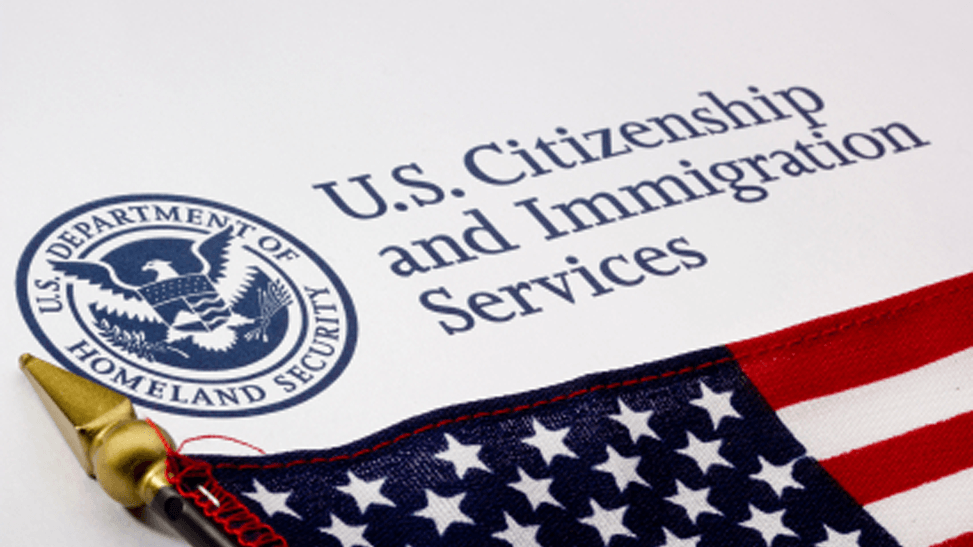Angelica Rice, Esq.

Angelica Rice, Esq.
Email: arice@santoslloydlaw.com

By Angelica Rice
•
March 6, 2025
In January 2025, the U.S. government introduced a mandate requiring all individuals without legal status in the country to register with federal authorities. This initiative aims to enhance national security and ensure compliance with existing immigration laws. If you or someone you know is affected by this change, it's essential to understand the specifics of this requirement and how to comply. Who Is Already Registered? Many individuals have already fulfilled their registration obligations through prior interactions with U.S. immigration authorities. You are considered registered if you have been issued any of the following documents: Lawful Permanent Resident Card (Green Card) Form I-94 or I-94W (Arrival/Departure Record), even if the period of admission has expired Immigrant or nonimmigrant visa issued before arrival Employment Authorization Document (EAD) Border Crossing Card Additionally, if you have applied for lawful permanent residence using forms such as I-485, I-687, I-691, I-698, or I-700, even if the applications were denied, or if you were paroled into the U.S. under INA 212(d)(5), you have met the registration requirement. Who Needs to Register Now? If you have not been registered through any of the means mentioned above, you are required to register under the new mandate. This includes: Individuals aged 14 or older who were not registered and fingerprinted when applying for a visa and have remained in the U.S. for 30 days or longer. They must apply before the expiration of those 30 days. Parents or legal guardians of children under 14 who have not been registered and have been in the U.S. for 30 days or longer. They must register their children before the 30-day period ends. Any individual who turns 14 years old in the U.S. and was previously registered. They must apply for re-registration and fingerprinting within 30 days after their 14th birthday. Notably, American Indians born in Canada who entered the U.S. under section 289 of the INA and members of the Texas Band of Kickapoo Indians who entered under the Texas Band of Kickapoo Act are exempt from this requirement. How to Register The U.S. Citizenship and Immigration Services (USCIS) is developing a new form and process for registration. Starting February 25, 2025 , individuals required to register should create a USCIS online account in preparation for the registration process. Once the process is implemented, registrations will be submitted through this online account. Important Considerations Registration Is Not an Immigration Status: Completing the registration does not grant any immigration status, employment authorization, or other rights or benefits under U.S. law. Consequences of Non-Compliance: Failure to comply with the registration requirement may result in fines, imprisonment, or both. At Santos Lloyd Law Firm, P.C., we are committed to guiding you through this process with compassion and expertise. Our trusted immigration lawyers are here to provide the information and assistance you need during this time. For personalized guidance and support, please contact Santos Lloyd Law Firm, P.C., and speak with one of our experienced immigration attorneys. We are dedicated to helping you navigate these changes and securing a hopeful future.

By Angelica Rice
•
January 31, 2025
On January 28, 2025, Secretary of Homeland Security Kristi Noem vacated the January 10, 2025, decision by former Secretary Alejandro Mayorkas that had extended the 2023 designation of Temporary Protected Status (TPS) for Venezuela and ordered that his January 17, 2025, notice re-designating Venezuela TPS be vacated. This action has understandably caused confusion and concern among Venezuelan TPS beneficiaries and those with pending applications. It is critical to clarify that this does not mean that the TPS program for Venezuela has been eliminated . Instead, the Department of Homeland Security (DHS) must now reconsider whether to re-designate (extend) or terminate the previous Venezuela TPS designations from 2021 and 2023. What Does the Vacatur Mean? Because the January 17, 2025, TPS extension was vacated, the most recent valid TPS designation for Venezuela remains the October 3, 2023, designation . The vacatur does not immediately affect TPS protections for individuals covered under the prior designations. However, DHS must make key decisions in the coming months: By February 1, 2025 , DHS must decide whether to extend or terminate the October 3, 2023, designation . By July 12, 2025 , DHS must decide whether to extend or terminate the March 9, 2021, designation . If the Secretary does not make a timely determination (for example, if the Secretary were not to make determination by February 1, 2025 whether to extend or terminate the 2023 Venezuela TPS designation), then the statute provides for an automatic extension of the designation for an additional period of 6 months . INA 244(b)(3)(C), 8 U.S.C. 1254a(b)(3)(C). Until these decisions are made, TPS remains in effect under the previous designations , and those who have already been granted TPS are not immediately impacted. Who Is Affected and What Should You Do? Current TPS Holders If you were already granted TPS under the March 9, 2021, or October 3, 2023, designations, your status remains valid. You must continue to comply with all re-registration requirements to maintain your protection and work authorization. Re-registration period: TPS beneficiaries under the 2021 and 2023 designations must re-register between January 17, 2025, and September 10, 2025 , to maintain their legal status and work authorization. Individuals with Pending TPS Applications as of January 17, 2025 If you applied for TPS before January 17, 2025 , under a previous designation, your application will continue to be processed . If your application is approved, your TPS protection will remain valid at least until April 2, 2025 . There is no need to reapply. Individuals Who Applied for TPS Between January 10, 2025, and January 28, 2025 If you applied for TPS during this period, USCIS will cease processing your applications and issue refunds of any fees paid in association with those applications . Additionally, USCIS will invalidate EADs; Forms 1-797, Notice of Action (Approval Notice); and Forms 1-94, Arrival/Departure Record (collectively known as TPS-related documentation) that have been issued with October 2, 2026 expiration dates under the January 17, 2025 Mayorkas Notice. What Happens Next? Given the Biden administration’s prior support for TPS, many expect DHS to extend or re-designate Venezuela for TPS rather than terminate it . However, no final decision has been made , and Venezuelan nationals with TPS or pending applications should continue to follow updates closely. What Should You Do Now? If you currently hold TPS , continue to comply with all TPS renewal requirements and remain aware of DHS’s upcoming decisions. If you have a pending application , check USCIS updates regularly and consult with an immigration attorney for the latest guidance. If you applied between January 17, 2025, and January 28, 2025 , seek legal counsel to understand how the vacatur may affect your application. Stay Informed and Get Legal Guidance Our immigration firm is closely following these developments and will provide updates as soon as DHS makes its decision. If you have questions about your TPS status or how this memo affects your case, contact our office today for a consultation. For more information, refer to the official DHS notice on the vacatur: Vacatur of 2025 Temporary Protected Status Decision for Venezuela .

By Angelica Rice
•
December 6, 2024
Key Changes to T Visa Process (Effective October 23, 2024) U.S. Citizenship and Immigration Services (USCIS) recently updated its policy for T visas, which provide protection and legal status to noncitizen victims of severe human trafficking. This update, effective October 23, 2024, introduces key changes that streamline the application process and broaden access to benefits for trafficking survivors. One of the most impactful updates is the new ability for T visa applicants to receive work authorization while their T visa application is still pending. Immediate Work Authorization Eligibility In a major shift, T visa applicants can now file for and potentially receive work authorization before their T visa application is approved. Through the new “bona fide determination” process, USCIS assesses basic eligibility at the outset. If an application is deemed “bona fide,” the applicant may be granted deferred action and an Employment Authorization Document (EAD), allowing them to work legally in the U.S. while awaiting full T visa approval. This is a critical step forward, as applicants no longer need to wait until their T visa is approved to receive work authorization. Additional Policy Highlights “Any Credible Evidence” Standard The policy emphasizes that applicants can submit any form of credible evidence in support of their case. This approach ensures that survivors, who may lack traditional documentation, still have a fair chance to prove their situation. Victim-Centered and Trauma-Informed Approach The update reinforces a trauma-informed review process, prioritizing the needs and well-being of trafficking victims and making it more compassionate. Physical Presence Requirement Flexibility USCIS now allows certain exceptions to the rule that applicants must remain in the U.S. due to their trafficking situation, providing flexibility for those who may have briefly departed and returned. Clarified Reporting Requirement While applicants generally must report their trafficking to law enforcement with jurisdiction over trafficking cases, exceptions exist for individuals unable to report due to age or trauma. What This Means for Applicants The T visa offers temporary legal status to certain victims of human trafficking, typically allowing them to stay in the U.S. for an initial period of up to four years. With these updates, the T visa program is now more accessible and supportive, helping survivors gain stability and security sooner. Need Help with a T Visa Application? If you or someone you know is a trafficking survivor and may benefit from a T visa, we’re here to help. Contact us today for expert guidance on T visa applications and work authorization, and start your journey to legal protection and stability.
Angelica Rice is well-versed in Immigration Law and has a rare perspective when it comes to handling her cases.
As a former Department of Homeland Security ICE Prosecutor, Angelica has experience with and understands the viewpoint of opposing counsel. She is a seasoned trial attorney, whose main focus is representing clients before USCIS and the Immigration Court.
Angelica’s legal background is exceedingly diverse. Prior to joining Santos Lloyd Law, Angelica was the Director of the Immigration division of a boutique immigration law firm in Miami, Florida, worked as an Associate Attorney for a prominent family law firm, in addition to commanding the courtroom in her prior role as an Assistant Chief Counsel with the Department of Homeland Security ICE office in Los Angeles, California.
The combination of Angelica’s experiences and legal background makes her uniquely qualified to handle any and all immigration matters.
Find out more about Angelica
Areas of Practice
 Button
ButtonImmigration Law:
- Family Based Immigration:
- Adjustment of Status
- Asylum, Naturalization
- I-751 (Removal of Condition)
- I-601 and I-601A Waivers
- I-212, I-589
- USCIS Interviews
- Business Immigration:
- O-1B
- O-1A
- EB-2 NIW
- EB-1A
- E-2
- Removal Defense
- Immigration Court process
Education
 Button
Button- J.D., St. Thomas University School of Law, 2016
- Graduated Cum Laude
- Vice President of Competition, Trial
Team, 2015 – 2016- Member of Peter T. Fay Inn of
Courts
- B.A. in Criminology, University of Florida, 2013
- Graduated Cum Laude, 2013
- Member of Trial Team
Languages
 Button
Button- English
Bar Admissions
 Button
Button- Admitted to the Florida Bar
- Licensed to practice law before the United States Immigration Court
Honors & Awards
 Button
Button- Dean’s List, St. Thomas University School of Law, 2014 - 2016
- CALI Book Award, St. Thomas University School of Law, 2016
- Dean’s List, University of Florida, 2012 – 2013
Presentations
 Button
Button- "EB-2 NIW Updates: Current Trends and Strategies" Orange County Bar Association (OCBA) (January 2024)
- “How to Use Tech with Non-Tech Savvy Clients” American Immigration Lawyers Association (AILA) (September 2023)




